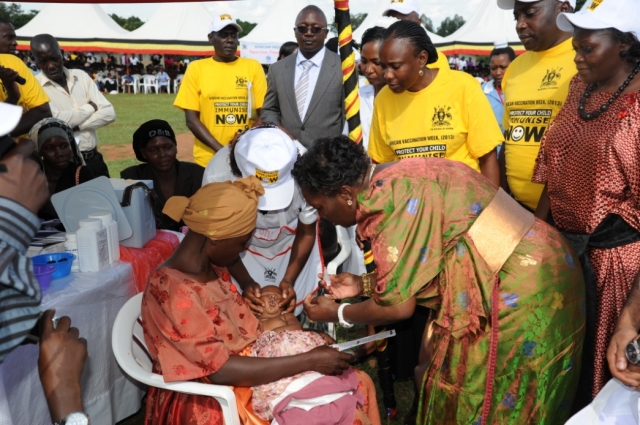
The 6th meeting of the Emergency Committee convened by the WHO Director-General under the International Health Regulations (IHR) (2005) regarding the Ebola virus disease (EVD) outbreak in West Africa took place by teleconference on Thursday, 2 July 2015, and by electronic correspondence from 2-6 July 2015.
As in previous meetings, the Committee’s role was to advise the WHO Director-General as to:
- whether the event continues to constitute a Public Health Emergency of International Concern (PHEIC) and, if so,
- whether the current temporary recommendations should be extended, or revised, or whether new temporary recommendations should be issued.
Presentations were made by representatives of Guinea and Sierra Leone on the current epidemiological situation in their countries, progress of the response operations, contact tracing and exit screening. A written statement was provided by Liberia, which included information on 3 recently confirmed cases of EVD in lower Margibi County. It also outlined steps being taken to investigate the cases, determine the primary source of infection, identify and follow contacts, and isolate and manage the cases.
The Committee reviewed developments since the previous meeting of 9 April 2015. These included decreased numbers of cases overall, a plateau in case incidence over the past 5 weeks, concentration of the outbreak primarily in Western areas of Guinea and Sierra Leone, as well as the identification of the 3 new cases in Liberia. The Committee noted WHO’s preparedness activities in neighbouring countries and stressed the importance of reinforcing cross-border collaboration between Guinea and Guinea-Bissau. The Committee noted with concern the new cases in Liberia and emphasized the need for ongoing investigation.
The progress of a number of research studies was discussed briefly, specifically those involving possible prolonged persistence of virus in semen, cohorts of survivors, and clinical trials of vaccines and convalescent serum therapy.
The Committee said that interagency collaboration, especially at community level, should be improved and that operational agencies should be able to communicate with communities in the appropriate language. With respect to the critical role of national leadership, the Committee noted the meeting of the Presidents of Guinea and Sierra Leone and commended their commitments to ongoing close collaboration.
Regarding the EVD response strategy, the Committee welcomed the move to a new phase, Phase 3, in which the focus will be on a detailed understanding of every chain of transmission. Defining and interrupting all remaining chains of transmission is central to Phase 3 and will be accomplished through an event-based management approach of treating each transmission chain as an “event”, with all related elements identified and managed together; enhanced identification and incentivizing of cases and contacts; and a response led by chiefs and owned by communities. Additional measures will be used to identify and reduce the residual risk in Ebola-free areas, including enhanced and adapted alert management; strengthened rapid response capacity at the regional and zonal levels; and improved engagement with and support for survivors. The plan for Phase 3 should be finalized rapidly and implemented expeditiously.
The Committee noted that although some improvements have been observed, inappropriate travel and transport measures continue to be implemented by numerous countries and a number of international airlines have still not resumed flights to the affected countries.
The Committee welcomed detailed data provided on exit screening, highlighted its importance and reinforced the need for it to continue.
The Committee advised that the EVD outbreak continues to constitute a Public Health Emergency of International Concern and previously issued temporary recommendations should be extended.
In addition, the Committee advised the Director-General to consider the following:
Recommendations for the most affected countries (Guinea, Liberia, Sierra Leone)
The Committee emphasized that the goal is to get to zero transmission as quickly as possible. Exit screening should be continued in the 3 affected countries. Detailed statistics on exit screening should be published monthly. The Committee called for international support for these countries to carry out effective exit screening.
The Committee advised these countries to further strengthen cross-border collaboration and communication, particularly between Guinea and Guinea-Bissau.
Affected countries should make every effort to retain and retrain health workers, and ensure the engagement of communities in all aspects of the response. The Committee emphasized the importance of providing social and psychosocial support to communities and support to persons placed in quarantine.
The Committee noted with concern the recent infections of a physician and an ambulance driver, which again underscore the importance of ensuring continued rigourous application of appropriate infection prevention and control measures in both private and public health facilities.
Recommendations for countries sharing borders with Guinea, Liberia and Sierra Leone
The Committee reiterated the critical importance of surveillance (especially near international borders), collaboration across borders, a strongly functioning alert system and contact tracing. These activities should be implemented with consideration of the extensive cross-border social and cultural linkages.
The Committee particularly recommended the further strengthening of preparedness and related capacities in Guinea-Bissau.
Travel recommendations for all countries
The Committee reaffirmed the need to avoid unnecessary interference with international travel and transport, and, as specified in Article 2 of the IHR, to implement only measures commensurate with the current public health risks.
Based on this advice and information, the Director-General declared that the 2014-2015 Ebola outbreak in these West African countries continues to constitute a Public Health Emergency of International Concern. The Director-General endorsed the Committee’s advice, extended the existing Temporary Recommendations as appropriate and issued the additional advice as new Temporary Recommendations under the IHR.
In addition, the Director-General reemphasized that there is no public health justification for refusing entry or quarantining travellers simply because they had been in, or are a citizen of, one of the affected countries. Any measures applied must be based on appropriate public health evidence or information about potential risks posed by the individual traveller.
The Director-General thanked the Committee members and advisors for their advice and requested their reassessment of this situation within 3 months or earlier should circumstances require.


